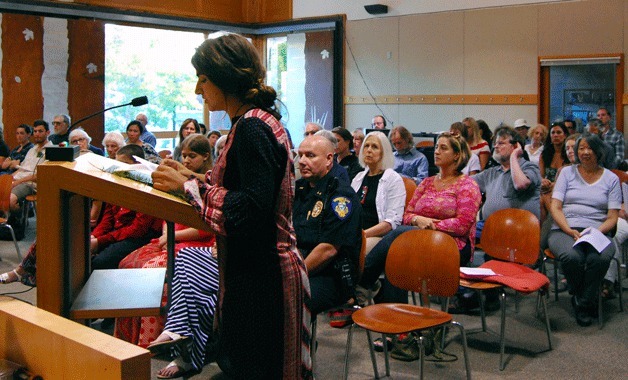After a two-day tree sit, Seattle television coverage and more than a hundred Bainbridge citizens picketing did little to stop some 800 trees from being cut down at the site of an impending shopping center on High School Road, last week’s multi-day protest migrated to city hall Monday.
This time, citizens were no longer asking to halt the clear cut across from Ace Hardware, but for fundamental change in the city’s planning process.
“On this resource-limited island, responsible growth is the only option,” Chiara D’Angelo, the college student who led the tree protest, told the council.
Residents filled the council chambers during this week’s meeting to ask city officials to make changes in the municipal code that can stop future developments by out-of-town companies like Visconsi from happening again on Bainbridge.
Visconsi, an Ohio-based developer, first brought plans to build a 62,000-square-foot shopping center to the city in 2012.
The development is planned to include a KeyBank branch, a drug store, pharmacy, restaurants, professional services and health care facilities.
Though a Bartell Drugs was originally sought, people familiar with the project said that the Northwest-based chain is no longer in the running as a potential tenant.
The proposal received mixed support from the beginning.
Anger over the project came to a head, though, when Visconsi received approval to begin clear-cutting the land earlier this month.
Two Mondays ago, D’Angelo sat 70 feet above ground on a wooden platform in the canopy of a Douglas fir tree on the Visconsi property to draw attention to the coming development and the loss of the forest along Highway 305 and High School Road.
She stayed there until late Tuesday evening when police arrived to clear the premises of the crowd of protesters that had formed at the foot of the tree and told D’Angelo if she did not come down she could be arrested and charged for trespassing.
The 19-year-old Bainbridge High School graduate is the first to do a tree sit in the state since 1999, organizers said.
“Our purpose was to create an unconventional platform to continue an authentic community dialogue, outside of corporate interests,” she said.
The tree sit ignited a crowd of citizens to speak out against the development and future developments like it.
Although the day after D’Angelo came down from her tree-top perch, construction equipment arrived and the trees came down, too, many residents are now asking city officials to make real change.
Bainbridge resident Eric Kuhner told the city council Monday that many community members, including himself, are concerned that the city failed to imbed the principles of the comprehensive plan into the city code.
There’s also a growing perception, he added, that because the planning commission’s recommendation to reject the project proposal was not followed, the planning commission itself is essentially powerless.
“It sends a message to citizens that our participation in the processes in the city is essentially window-dressing, and that we may as well not get involved at all because nothing that we do is going to make a difference anyway,” Kuhner said.
“There are a few actions the city might consider to help repair this perception, assuming that it is as we hope, a misperception,” he added.
Kuhner offered three solutions: pass a resolution affirming primacy to the Bainbridge Island Comprehensive Plan; pass an ordinance requiring the comp plan be followed in all land-use decisions so that it becomes part of the city code; and request a city manager’s report that offers changes that might be made to the process of approving a development.
Kuhner added that the city must also do more to guarantee that building regulations are based on the comp plan.
“Because why should we turn out for the comprehensive plan revisions that are happening right now to help shape that process if in the end those changes and those suggestions, recommendations don’t get codified?” Kuhner asked.
Ron Peltier of Islanders for Responsible Development, a grassroots group that challenged the Visconsi project and filed an appeal earlier this year to have the proposal turned down, said there was more to the city’s approval of the shopping development than the comp plan.
“I think the major cause of why Visconsi is happening against the will of the community and in violation of the special character of our island, is due to the climate that exists under this roof,” Peltier said in reference to city hall.
“It’s a climate that’s development-friendly and does not embrace the spirit of the comprehensive plan,” he said.
Peltier said that to make a real difference, there would need to be changes made within the city’s planning department.
D’Angelo also brought attention to the many citizens who turned out in protest of the clear cut last week.
“It happened because there was an intentional woman supported by a collective group of young Bainbridge Islanders putting our normal [lives] on hold to create an act of civil disobedience to protect our future, the only one we all have,” D’Angelo said.
“What the community said underneath that tree, should be taken as words in this room.”
Amid the variety of suggestions and opinions expressed during Monday’s council meeting, public comment ended with at least one resounding directive.
Former councilwoman Debbi Lester gave a brief presentation showing photos of the first plot of trees that were cleared last week.
She then asked the citizens at the meeting who opposed the development to stand and hold up leaves from the fallen trees.
“I think now we need to turn grief into action,” Lester said.



